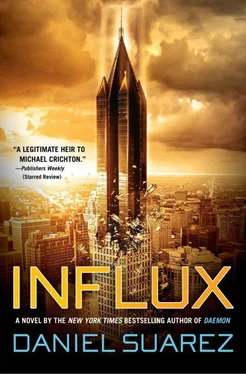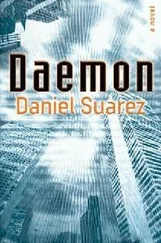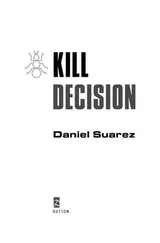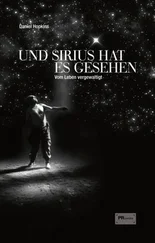Some minutes later Grady hopped a chain-link fence and crossed a darkened parking lot to the side of the conference center. He then followed a sidewalk back toward the brightly lit entrance of the building.
As he approached, he could see children and adults in outlandish costumes standing in groups near the buses—girls in spandex tights and futuristic helmets, guys wearing robes and prosthetic noses, covered in blue makeup or wearing plastic armor as they clutched imitation laser rifles. Still others moved about in street clothes, smiling and laughing as they took pictures of cosplaying conference attendees. Grady noticed everyone wore badges on lanyards with a logo that read “Space-Con” in shimmering letters. Promotional banners for sci-fi games and TV shows hung along the conference center walls and from crossbeams.
Hundreds more people poured out through the conference center doors. They all looked tired as they ambled toward a line of idling buses. Cars streamed out of the nearby parking structure. It was probably close to midnight.
Grady moved along with the crowd, passing down the line of buses. He tried to divine where each bus was going, but they had only numbers that glowed in various hues to Grady, caressing him with their geometry. He tried to stay focused on reality as he approached a bus driver standing near an open door. A conference attendee dressed as a tentacled alien chatted nearby, smoking a cigarette. The driver looked up at Grady.
Grady nodded. “What time we get back?”
“The Grand’s just cross town, man.”
“Oh. Wrong bus, sorry.”
“Which number you looking for?”
Grady started walking. “No, I got it.” He pointed. “It’s over here. Sorry.”
Grady walked a couple buses down to another driver. “When do we get in?”
“Which stop? Lansing or East Lansing?”
“East.”
“About one fifteen.”
“Thanks.” Grady moved to board the bus.
The driver pointed. “Your badge. I need to see your badge.”
“Oh, I lost it.”
The man shook his head. “You need the badge to get on the bus.”
“But I lost it.” Grady went through his pockets.
“What do you mean you ‘lost’ it? You shoulda just left it on your neck.”
“Look…” Grady pulled some money from his pocket. “How about sixty bucks?”
The man shook his head. “Just go find your badge, but you got to hurry because we’re leavin’ in a few minutes.”
“It’s been a long day. I mean, let me just pay for the ride.”
“I don’t sell tickets, man. Why can’t you eggheads just follow rules?”
“Here, consider it a tip. Just let me get home.”
The guy hesitated but then furtively took the money. “Go on. Get in.”
Grady moved swiftly up the steps and down the aisle. The bus was surprisingly full, with worn-out-looking con attendees leaning against one another, eyes closed. A few still had cosplay costumes on, and Grady heard snatches of their conversation as he passed by, ducking under a plastic robotic arm.
“You know that pulse rifle isn’t canon for a Provincial Scout, right?”
“The graphic novel was better than the show, but the book was better than the graphic novel.”
Grady took the first open seat, across from a young couple dressed in matching sets of foam power armor. They were sleeping, gauntleted hands intertwined. Between them, also asleep, was a boy of about six, dressed in a monk’s robe.
For the first time since his escape, Grady exhaled fully and felt the tension dissolve. The young family’s contentment helped him relax.
And all at once he noticed something about the people around him. It was as though they knew, somewhere deep down, that the future was overdue.
The power armor. The laser rifles. The robots.
They thought they were pretending, but Grady, alone among them, knew that the future had already happened. It was as though they sensed it. They’d re-created that future in foam and rubber—determined to live in it.
A slight grin stole across his face as he appraised them, and Grady no longer had any doubt. Hedrick was wrong. These people were ready for the future. Impatient even.
Join us, Denise?”
Special Agent Denise Davis turned to see Thomas Falwell and Dwight Wortman in the lobby of the Dirksen Federal Building in downtown Chicago. She smiled. “You look happy.”
“Why shouldn’t I be? Cotton will be convicted, and we’ll get to move on with our lives.”
“Amen to that. You’ll probably get a promotion.”
He grimaced. “You mean my old job back.”
“Ah.”
They exited through the security station and onto Dearborn.
“Wallace said to keep our eyes peeled for Winnowers.”
Falwell waved it away. “The Winnowers don’t want to spoil the trial. Cotton’s reveling in the media spotlight. Can you believe the play it’s getting?”
“Even more reason.”
They were moving now through a rush-hour crowd on the sidewalk, following the rest of her team to a neon sign that spelled out “The Berghoff” in rolling script. The joint fronted half the block, and as the group entered the high-ceilinged tavern, they moved through a crowd to an oak bar with brass rails. Dwight had already scored a few stools.
“What are you guys having?”
Davis shouted, “Beer. And the first round’s on me.”
Some minutes later they clinked glasses of amber lager.
“To the end of a long, long road.”
“Hear, hear!”
As Davis looked into the eyes of her team, she felt content. She’d been on the Cotton case nearly seven years, Falwell ten. Remembering all the long hours, the poring through endless financial and travel records, all the boring details that investigative work entails—and then responding decisively when those rare moments of action came.
She truly cared about these people. And she respected them. It was nice to know that all their hard work was about to be rewarded.
Before long Davis placed her empty glass on the bar.
Dwight pointed. “Another, Denise?”
“Sure.” But she thumbed toward the back of the barroom. “Gotta hit the loo first.”
Dwight called after her, “Keep your head on a swivel.”
Falwell laughed. “Yeah, or we’ll come looking for you.”
She moved through the crowd of office workers toward the restroom sign. She had a mild buzz on, and things looked good. She remembered this feeling of camaraderie from army intelligence work. You might not be thrilled about the mission, but at least you were in it together.
In the restroom stall Davis daydreamed about a GS-13 Step 5 pay grade—maybe with a locality adjustment thrown in, if she could get transferred back to Denver. She might not have to live a long-distance relationship anymore. That meant serious plans. Life plans.
On her way out of the restroom a man of medium build in a sweatshirt and jeans blocked her path. He looked familiar—but not in a bad way. Not threatening. Where did she remember that face from? Perhaps a witness or juror? He had the vibe of a community college professor.
“Agent Davis?”
“Where do I know you from? If you’re connected to the trial, we shouldn’t be talking.”
“No. Agent Davis, I’m Jon Grady. One of Richard Louis Cotton’s bombing victims.”
Davis frowned. “None of Cotton’s victims survived.”
He stared back. “I know.”
That’s when Davis saw the intensity in the man’s eyes. The nervous glance behind him.
Davis stepped back and drew her Glock 17 pistol in a smooth motion, leveling it at his chest with a dual grip. “Hands!”
The man raised his hands in confusion. “I don’t know who you think I—”
Читать дальше












